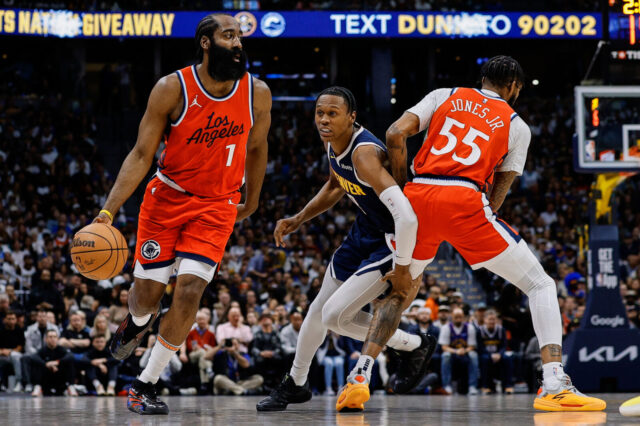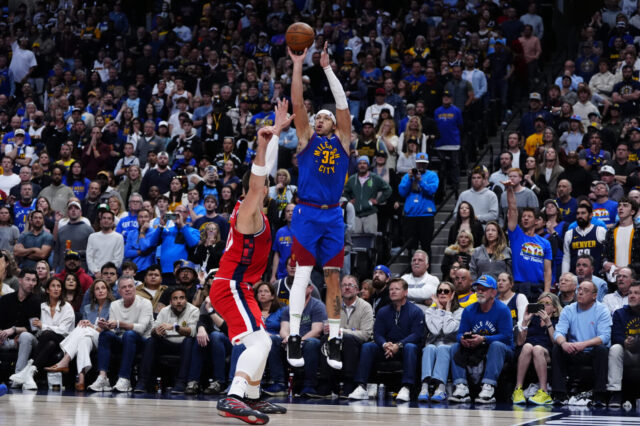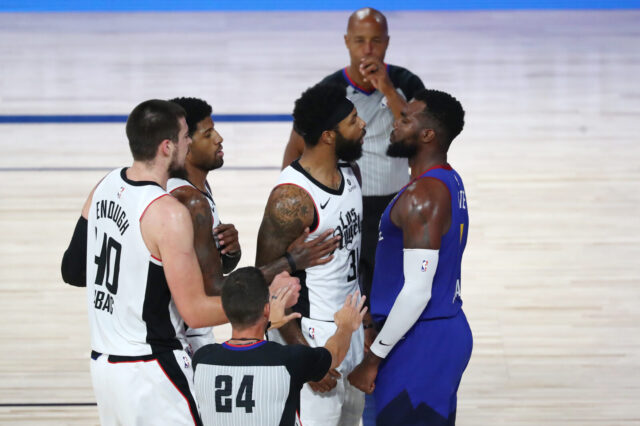Now that the details of the NBA’s new collective bargaining agreement (CBA) have emerged, it’s time to ask: will this new world order of the NBA be good or bad for our Denver Nuggets?
I've long told friends that I don't foresee the Nuggets winning a championship in my lifetime. (Hell, we're the only ABA holdover that's never even appeared in an NBA Finals.) This isn't because I don't believe in the stewardship of Josh Kroenke and Masai Ujiri, each of whom I've gotten to know well and I have great confidence in for the future of our franchise. In fact, if ever the Nuggets will compete for a championship it's now with these two astute basketball junkies at the helm.
But rather, I still believe that the “system” of the NBA puts small market teams at a continued, although less severe thanks to the new CBA, disadvantage. As long as big market teams don’t have to share a substantive portion of their local revenue (as they do in Major League Baseball but not the NBA) and can poach stars from smaller markets via trade-and-signs (a clause preserved in the new CBA), the more things appear to have changed over Thanksgiving weekend the more they stayed the same. It’s no secret that the NBA has had just nine franchises win a championship since 1980, and I suspect one of those nine – the Lakers, Heat, Bulls, Mavericks or Celtics – will be in possession of the Larry O’Brien Trophy next summer.
From my vantage point, the new CBA basically boils down to the owners reclaiming a much higher percentage of basketball-related income (BRI) than what they were entitled to under the previous CBA combined with marginal changes to guaranteed contracts, extend-and-trades and limitations on player exceptions that still allow players to hijack their franchises via forced trades and owners to be stupid with their spending (but not quite as stupid as they were before). According to the always amazing Larry Coon of ESPN.com, "a new plan approximately triples the amount of money that is revenue-shared" is on the way, but this skeptical small-market fan will believe it when he sees it.
So in lieu of knowing exactly how the NBA's new revenue-sharing plan will shake out, let's look at Coon's dissection of the new CBA and analyze how each piece of the agreement will affect our Denver Nuggets – for good, or for bad.
Amnesty Provision
The Gist: One player, signed under the previous CBA, can be waived prior to the season commencing on December 25th. The balance of the player's contract – minus whatever another team pays him – must be paid out, but it doesn't affect the salary cap. Interestingly, the amnesty provision doesn't have to be used this year, although I'm not sure when the provision expires.
How this affects the Nuggets: When you think “Amnesty Clause” a Nuggets fan immediately thinks “Al Harrington.”
Some call him “Big Al” for being so overweight last season. Others refer to him as “Mark Warkentien’s Revenge.” Regardless, by any objective measure Harrington was a marginal contributor last season. But Nuggets head coach George Karl insisted that Harrington was integral to the team’s success, Harrington has a great personality and locker room rapport with teammates and – allegedly – has been getting himself into impeccable shape during the offseason, having been dissatisfied himself with his 2010-11 performance.
That doesn't change the fact that Harrington is owed $27 million (not all guaranteed) over the next four seasons.
But “amnesty-ing” Harrington now may not be a wise move. As we’ll get to shortly, under the new CBA teams are obligated to spend 85% of the $58 million salary cap and the Nuggets’ current payroll has them at about 50%. And with the Nuggets missing and/or potentially missing several players (Kenyon Martin, Wilson Chandler and Nene) that play Harrington’s two positions – power and small forward – keeping Harrington may be a fiscal must in addition to a “devil you know versus the devil you don’t know” type scenario.
Luxury Tax
The Gist: Higher penalties for team's that exceed and then greatly exceed the NBA's "tax threshold", anticipated to be in the $68-$70 million range. The theory is that this will curb overspending by teams simply trying to buy a championship, something the Nuggets tried to do in 2007-08 when they assembled an $84 million roster that netted not a single playoff victory.
How this affects the Nuggets: This isn’t 2008 anymore and there’s no way Josh or Stan Kroenke are going to commit the Nuggets to the luxury tax again, regardless of the new penalty structure. Even before Ujiri showed up, the Nuggets were getting more fiscally prudent by getting a lot of bang out of minimal bucks for players like Dahntay Jones, Chris Andersen, Anthony Carter, Joey Graham and more recently, Arron Afflalo and Gary Forbes.
In theory, tougher tax penalties for big spenders combined with a more robust revenue-sharing system should put the Nuggets on equal footing with the likes of the Lakers, Knicks and Bulls. But I’m skeptical. The cache of wearing a Lakers jersey or playing in a city like New York cannot be matched by the Nuggets. And even though the new tax penalties should be welcomed by fans of small market teams, the new CBA has enough loopholes in it for big markets to sign big stars away from small markets
Additional Limits for Taxpaying Teams
The Gist: Starting in 2013-14, teams over the tax level will have less money to spend on midlevel exception players and cannot receive a player in a sign-and-trade deal.
How this affects the Nuggets: Again, this should – in theory – greatly help a small market team like the Nuggets. But midlevel exceptions is where bad Al Harrington contracts come from. So buyer beware!
Stretch Provision
The Gist: A player signed under the new CBA only can have his salary "stretched" out over twice the number of remaining seasons plus one in regards to how it affects the team's salary cap, after he is waived.
How this affects the Nuggets: Where was this clause when we signed Kenyon Martin to one of the worst contracts in NBA history?!
Let's hope the Nuggets don't enter into another bad contract that's even close to K-Mart range, but if they do this clause could come in handy.
New Contracts
The Gist: Teams can re-sign their own player (who has been on the roster for at least three seasons) for five years with 7.5% raises versus only four years with 4.5% raises to poach another team's player via free agency.
How this affects the Nuggets: As we all know, in 2010 the Nuggets were able to offer Carmelo Anthony more guaranteed years than any other team in hopes of retaining him. That wasn’t good enough for Melo, and he forced a trade to New York last February. So even though the NBA has reduced the number of guaranteed years and altered the raises, we will still see stars hijack their franchises for greener pastures elsewhere.
It should be noted, however, that this clause is a double-edged sword of sorts. For every Melo, LeBron James and (soon-to-be, just watch) Chris Paul who force a sign-and-trade so that their receiving team retains their “Bird Rights” (the three-year rule), there are Michael Redds who stay on with their small-market team, take the extra guaranteed year plus the raise and then cripple their small-market team financially. Could this happen with Nene? Mark Kiszla sure thinks so.
Extend-and-Trade
The Gist: A team can extend its own veteran player by four seasons but in an extend-and-trade situation (like we saw with Melo going to the Knicks), the receiving team can only extend them for three seasons.
How this affects the Nuggets: Had this been in effect last year, Melo still would have forced his way to New York. Moving forward, a player without Melo's endorsement dollars might have more incentive to stay put and take that fourth guaranteed year.
Midlevel Execption
The Gist: Pending on a team's luxury tax status, the midlevel exception is no longer a one-size-fits-all number for all teams, in theory curbing big spenders' ability to load up their roster with solid veterans surrounding their superstars.
How this affects the Nuggets: Unlikely to ever be a tax-paying team again, this clause probably won't affect the Nuggets much going forward. As a small market franchise, the Nuggets will continually be faced with the difficult decision of overpaying veterans (like Harrington) to attract them to come to Denver and keep the Nuggets competitive. But at least Denver isn't Cleveland.
Trade Rules
The Gist: If a team is under the tax line, they have more flexibility salary-wise with which to make trades – i.e. the salaries don't have to match up within 125% but rather within 150%.
How this affects the Nuggets: Again, by likely not being a tax-paying team the Nuggets should have great flexibility to make trades before the deadline.
The 85% Rule
The Gist: Under the new CBA, NBA teams are mandated to spend 85% of the salary cap, or $49.3 million in 2011-12.
How this affects the Nuggets: This one worries me the most.
At present, the Nuggets total committed salary is just under $29 million meaning they have to somehow come up with another $20 million in salary to get to their 85% mandate. If Nene re-signs at $12 million (regardless of whether we agree or not if he's overpaid) and Afflalo re-signs at, say, $5 million, then a few more veterans combined with rookies Kenneth Faried and Jordan Hamilton's contracts should solve the 85% issue.
However, if Nene does not re-sign with Denver, then what? Are the Nuggets supposed to fill a $10-$12 million void with veterans we don't really want just to get to $49.3 million in total salary? Are those one-year contracts or do they have to be multi-year deals just to get players to come here? To me, the 85% clause makes the will-he or won't-he Nene question the biggest facing our franchise at present.
Needless to say, with the various aspects of the new CBA in place, it's going to be a very interesting few weeks in Nuggets Nation.


